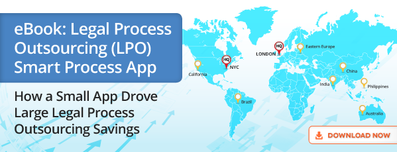Legal Process Outsourcing – Embracing the Change
Ask your department to change a process. Go ahead. I’ll wait.
What did you hear back?

“Why change? It’s working fine.”
“It’s never been tried before.”
“Customers won’t buy it.”
What is it about change that brings out the mule in people? These responses and 47 more like them were recorded and published in 1959*. Yet, they still get a great workout in 2013.
Departments – like individuals – form (or inherit) habits, requirements, processes and perspectives and then often hold on to them with undying loyalty. And this loyalty can continue even when it is acknowledged that the habits are negatively impacting performance and productivity.
Take, for example, legal process outsourcing (LPO). By outsourcing repetitive or specialized legal projects such as records management, patent applications, research or eDiscovery, law departments can better control costs, gain additional expertise and create higher levels of service for their clients.
However, this forward-thinking model often suffers from a reliance on traditional tools that impede the process.
The most common methods of tracking LPO activities and results usually involve manual processes and inadequate tools. Spreadsheets identify who handled an individual case and the overall status. Emails contain matter-specific information and conversations that are privy only to individual accounts holders. Word documents house important drafts across multiple servers or machines. When you factor in the number of projects and the individuals handling them worldwide, the result is a process that lacks transparency and accurate reporting, and (frankly) wastes valuable time.
It’s time to reject the mule and embrace the change.
The alternative to this hand-me-down process is a new category of software called Smart Process Apps. This new cloud-based software provides highly dexterous applications that easy accommodate collaboration-heavy processes with an intuitive user interface – and it runs right in a web browser. In fact, these Apps are becoming so prevalent that Forrester estimates the market for them will reach $34 billion by 2015.
With a Smart Process App, law departments can easily collect, automate, store, route and report on LPO projects and activities. It establishes a more systematic, intuitive and transparent approach to managing work portfolios and evolves users beyond the use of familiar (yet inadequate) tools that are used simply because they are handy. Its configurability and features can accommodate the collaborative and unpredictable process and provide structure, reporting and organization visibility that tools such as Outlook, Excel, Word and SharePoint cannot.
In fact, one law department saved more than $1 million in costly outside counsel spend and now sources the appropriate attorneys to handle their appropriate work – all thanks to the adoption of a Smart Process App.
* Thanks to Bill Taylor for sharing this list in his article “The More Things Change, the More Our Objections to Change Stay the Same.” This is worth a read!
Image courtsey freedigitalphotos.net and Danilo Rizzuti






